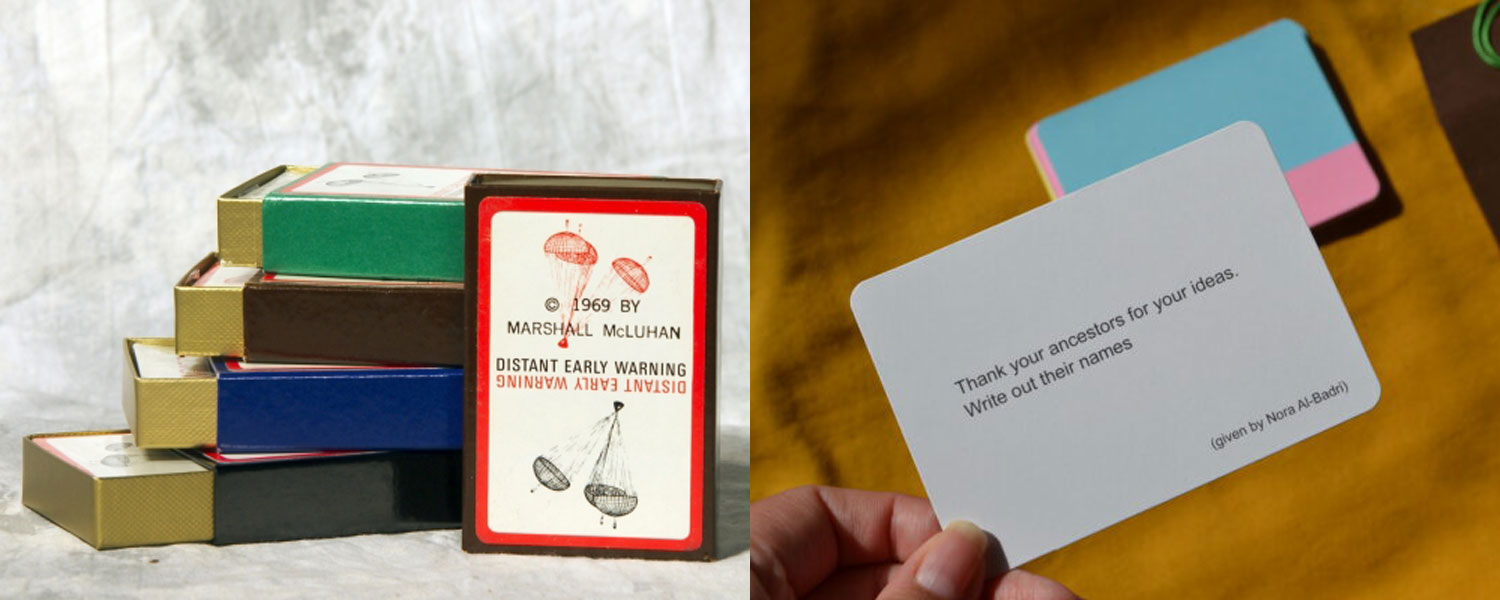"The tornado [in The Wizard of Oz] is just such an untrustworthy, sinuous, shifting shape. Random, unfixed, it wrecks the plain shapes of that no-frills life." – Salman Rushdie
Created in 1974 by Brian Eno and Peter Schmidt, Oblique Strategies is a set of cards to help break out of creative block and to interject new directions into one's artistic process. Originally, deck was just a set of hand-drawn cards created separately by Eno and Schmidt (see it version here) but was later published for sale several times. The goal of the cards, which have inspired lots of other versions and variations, is to break you out of creative ruts, to suggests new directions in the work, and/or to find solutions to problems in the studio.
Above: Marshall McLuhan's "Distant Early Warning" (1969) and Abandon Normal Devices' "Abandon Normal Strategies" (2020) card decks
Inside the deck, Eno and Schmidt offer these instructions:
"These cards evolved from separate observations of the principles underlying what we were doing. Sometimes they were recognised in retrospect (intellect catching up with intuition), sometimes they were identified as they were happening, sometimes they were formulated. They can be used as a pack (a set of possibilities being continuously reviewed in the mind) or by drawing a single card from the shuffled pack when a dilemma occurs in a working situation. In this case the card is trusted even if its appropriateness is quite unclear. They are not final, as new ideas will present themselves and others will become self-evident."
We'll use an online version of the cards today as a generative, exploratory tool and as a way to start thinking about how you might incorporate the ideas we've talked about today in your own practice.
- Identify a way of making (drawing, writing, sound-making, photography, movement, etc) you'd like to use during this exercise. Ideally this would be connected to your own practice but that's not required
- Whatever process you pick, it should be something that allows you to pivot quickly as you draw cards
- We'll spend about 30 minutes making together, drawing a card (online) every few minutes
- With each new card, try to:
- Embrace the prompt in as open a way as you can
- Respond/adjust your making as quickly as possible
- Don't worry if the resulting work sucks – it probably will!
- If you want to, feel free to take some quick notes too, especially if you think of ways this connects to/has friction with your usual practice
With some experience with Eno and Schmidt's cards, we'll create our own set of prompts together. Take some time alone to write as many prompts as you can think of.
Consider:
- Places in the process of making where chance could be inserted
- Open-ended actions that change the course of making or ask us to reconsider something
- Ways of disturbing, upsetting, or otherwise altering with chance
- Can be directed at a particular media, action, duration, mindest, etc
- Or be poetic and open to interpretation
When everyone is done, look through your ideas and pick approximately five that you feel excited about. Copy/paste them into this Google spreadsheet. You can find printable versions of the cards we created today that will fit nicely in the box with the full set in the Resources folder.
While you can access them online, you can also buy a full set of Oblique Strategies as well as other decks inspired by Eno and Schmidt:
- Original deck of Oblique Strategies
- Abandon Normal Devices' Abandon Normal Strategies, a set of additional cards by new media artists
- Grotesque Tables II by Noah Wall, where all cards are anagrams of Eno and Schmidt's originals
- IDEO's Method Cards, meant for designers (costs $50 USD, but you can find the PDF here)
- If you have a ton of money lying around, you can also buy a copy of Marshall McLuhan's Distant Early Warning cards
